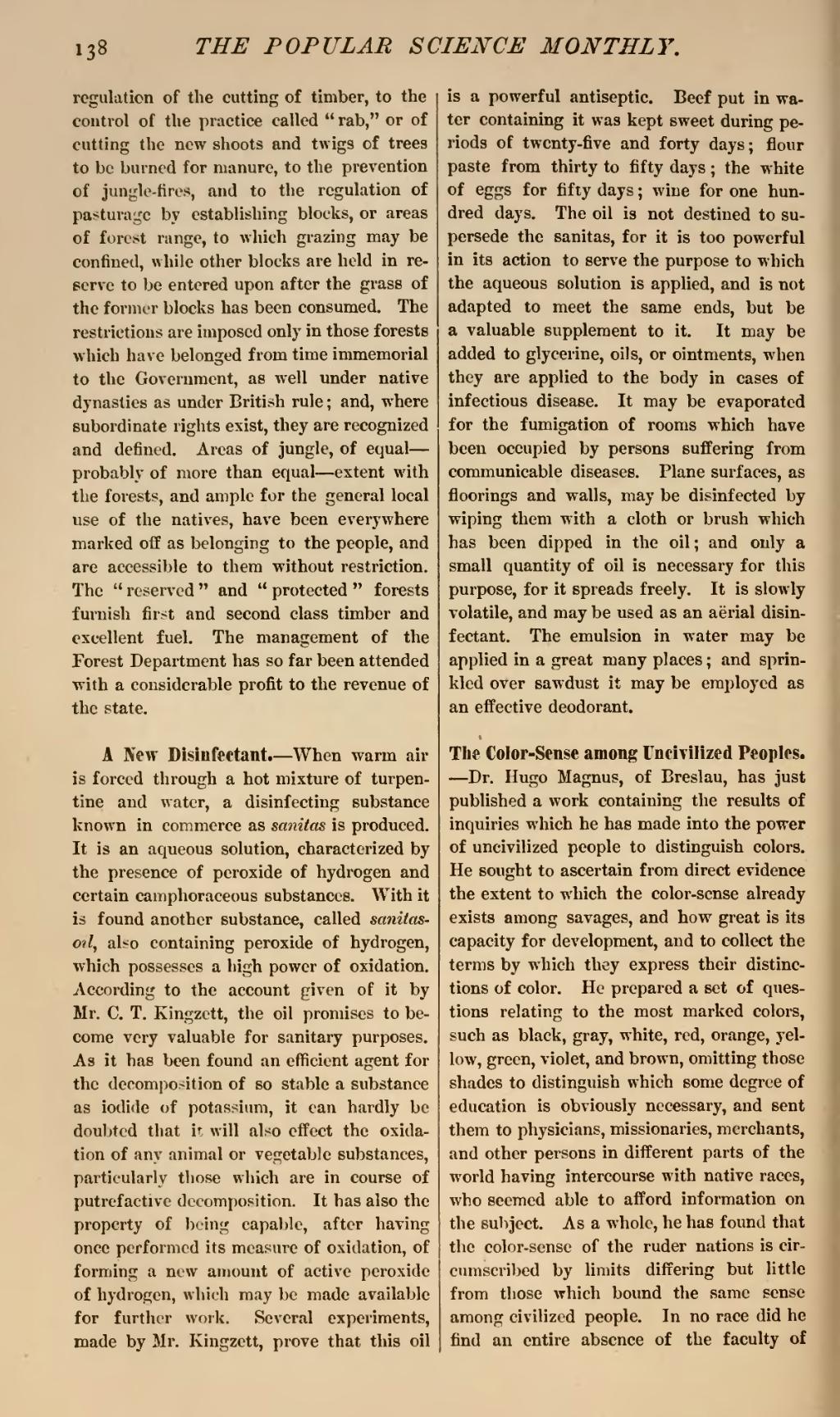regulation of the cutting of timber, to the control of the practice called "rab," or of cutting the new shoots and twigs of trees to be burned for manure, to the prevention of jungle-fires, and to the regulation of pasturage by establishing blocks, or areas of forest range, to which grazing may be confined, while other blocks are held in reserve to be entered upon after the grass of the former blocks has been consumed. The restrictions are imposed only in those forests which have belonged from time immemorial to the Government, as well under native dynasties as under British rule; and, where subordinate rights exist, they are recognized and defined. Areas of jungle, of equal—probably of more than equal—extent with the forests, and ample for the general local use of the natives, have been everywhere marked off as belonging to the people, and are accessible to them without restriction. The "reserved" and "protected" forests furnish first and second class timber and excellent fuel. The management of the Forest Department has so far been attended with a considerable profit to the revenue of the state.
A New Disinfectant.—When warm air is forced through a hot mixture of turpentine and water, a disinfecting substance known in commerce as sanitas is produced. It is an aqueous solution, characterized by the presence of peroxide of hydrogen and certain camphoraceous substances. With it is found another substance, called sanitas-oil, also containing peroxide of hydrogen, which possesses a high power of oxidation. According to the account given of it by Mr. C. T. Kingzett, the oil promises to become very valuable for sanitary purposes. As it has been found an efficient agent for the decomposition of so stable a substance as iodide of potassium, it can hardly be doubted that it will also effect the oxidation of any animal or vegetable substances, particularly those which are in course of putrefactive decomposition. It has also the property of being capable, after having once performed its measure of oxidation, of forming a new amount of active peroxide of hydrogen, which may be made available for further work. Several experiments, made by Mr. Kingzett, prove that this oil is a powerful antiseptic. Beef put in water containing it was kept sweet during periods of twenty-five and forty days; flour paste from thirty to fifty days; the white of eggs for fifty days; wine for one hundred days. The oil is not destined to supersede the sanitas, for it is too powerful in its action to serve the purpose to which the aqueous solution is applied, and is not adapted to meet the same ends, but be a valuable supplement to it. It may be added to glycerine, oils, or ointments, when they are applied to the body in cases of infectious disease. It may be evaporated for the fumigation of rooms which have been occupied by persons suffering from communicable diseases. Plane surfaces, as floorings and walls, may be disinfected by wiping them with a cloth or brush which has been dipped in the oil; and only a small quantity of oil is necessary for this purpose, for it spreads freely. It is slowly volatile, and may be used as an aërial disinfectant. The emulsion in water may be applied in a great many places; and sprinkled over sawdust it may be employed as an effective deodorant.
The Color-Sense among Uncivilized Peoples.—Dr. Hugo Magnus, of Breslau, has just published a work containing the results of inquiries which he has made into the power of uncivilized people to distinguish colors. He sought to ascertain from direct evidence the extent to which the color-sense already exists among savages, and how great is its capacity for development, and to collect the terms by which they express their distinctions of color. He prepared a set of questions relating to the most marked colors, such as black, gray, white, red, orange, yellow, green, violet, and brown, omitting those shades to distinguish which some degree of education is obviously necessary, and sent them to physicians, missionaries, merchants, and other persons in different parts of the world having intercourse with native races, who seemed able to afford information on the subject. As a whole, he has found that the color-sense of the ruder nations is circumscribed by limits differing but little from those which bound the same sense among civilized people. In no race did he find an entire absence of the faculty of

